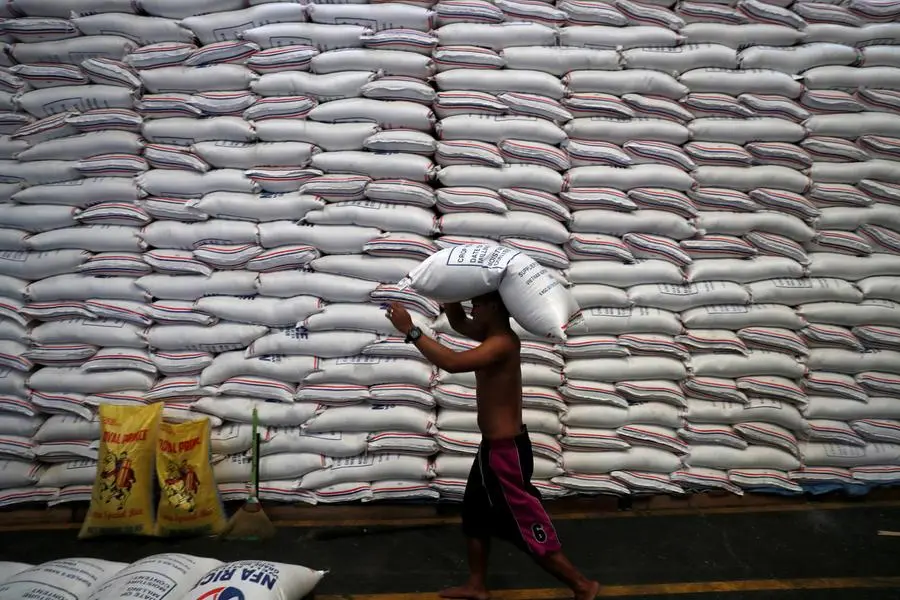PHOTO
The Department of Agriculture is working to achieve the P20-per-kilo rice campaign promise of President Marcos amid the high retail price of the staple, Agriculture Secretary Francisco Tiu Laurel Jr. said on Monday.
'We are trying our best to figure out and think of ways (to achieve the P20 per kilo of rice). Almost every week, this (P20 per kilo of rice) is our major topic, on how to bring down (the retail price of rice) to the level of P20 (per kilo),' Tiu Laurel said in a television interview hours before the third State of the Nation Address (SONA) of President Marcos yesterday.
Reducing the price of rice to P20 per kilo was one of the campaign promises Marcos made during the 2022 presidential race.
'It is for this reason that we started our initial target as we need to implement a step-by-step approach. If we can achieve our initial target and the P29 per kilo (of rice) becomes sustainable for our disadvantaged (sectors) in Kadiwa centers, we will try to expand this and try to lower (the retail prices of rice) up to P20 (per kilo),' Tiu Laurel said.
The Kadiwa outlets sell rice at P29 per kilo every Friday, Saturday and Sunday to vulnerable households that include members of the Pantawid Pamilyang Pilipino Program (4Ps), solo parents, senior citizens and persons with disabilities.
'It involves a lot of things. It needs a whole-of-DA, whole-of-nation approach, from the cost of seeds, postharvest, roads, cheap fertilizer and the need for higher recovery of palay during drying,' Tiu Laurel added.
Tiu Laurel said that the DA targets to increase the recovery rate of palay to 67 percent from 55 percent.
'From 55 percent, we need to increase (the recovery rate of palay) to 65 to 67 percent and then we have to produce more. We need to increase the production from six to seven percent (per hectare) or hopefully eight percent, and we will be able to bring down the prices, we can achieve this (P20 per kilo of rice),' he said.
Tiu Laurel cited as a bigger problem the bureaucracy in the government.
'We are trying our best. The problem with the government is the bureaucracy in the bidding. I am tackling this as it is the biggest issue today. Funding was given for this year until next year and hopefully this will continue until 2026, 2027. We will be able to receive enough funding to construct all the necessary infrastructure,' he said.
Based on the monitoring of the DA in Metro Manila markets, the retail price of local regular milled rice was still sold at prices as high as P50 per kilo; local well-milled rice, P55 per kilo; local premium rice, P58 per kilo and local special rice, P65 per kilo.
Imported regular milled rice was still sold for as high as P49 per kilo; imported well-milled rice, P55 per kilo; imported premium rice, P60 per kilo and imported special rice, P65 per kilo.
The high imported rice prevails despite the implementation of Executive Order (EO) 62 on reduced tariff on imported rice.
The EO, which took effect on July 7, slashed rice tariffs to 15 percent from 35 percent.
During his SONA yesterday, Marcos said the high prevailing rice prices in the market are caused by the elevated world prices of the grain caused by geopolitical tensions and global supply problems worsened by extreme weather phenomena like El Niño.
He said the country still needs to import rice since local production remains insufficient to meet the overall demand. The record-high palay harvest last year of 20 million metric tons translated to at least 13 million MT of rice, which he noted is short of the 16 million MT estimated annual rice requirement of the country.
The country imported some 3.6 million MT of rice last year.
'That is why we were forced to import. But we will still provide priority to local production that is why we will continue supporting our agriculture sector to boost production and make it more efficient,' Marcos said.
Marcos also assured farmers that the extension of lower tariffs on key commodities such as rice and pork is just an emergency measure to temper the rise in food costs.
He said the extended reduced tariff rates on pork, corn and particularly rice are not long-term measures.
'We extended reduced tariff rates to facilitate the importation of rice, corn and pork until the end of this year,' he said.
'Tinitiyak ko sa ating mga magsasaka at sa buong sektor ng agrikultura na ang mga ito ay pawang pangkagipitang solusyon lamang,' he added. (I assure the farmers and the entire agriculture sector that these measures are only emergency solutions)
Agriculture industry stakeholders were taken aback when Marcos decided to extend lower tariffs on imported corn, pork and rice.
Tiu Laurel, meanwhile, said he expects Congress to pass a law that will extend the Rice Tariffication Law (RTL) or Republic Act 11203.
'The Rice Tariffication Law will expire soon and the position of the DA is that it needs to continue and Congress is supportive of this. I am hopeful that it will be extended so that more farmers will be given support, especially on rice, we need to extend the RTL,' he added.
Copyright © 2022 PhilSTAR Daily, Inc Provided by SyndiGate Media Inc. (Syndigate.info).





















